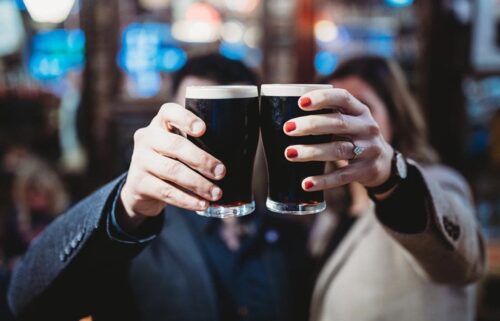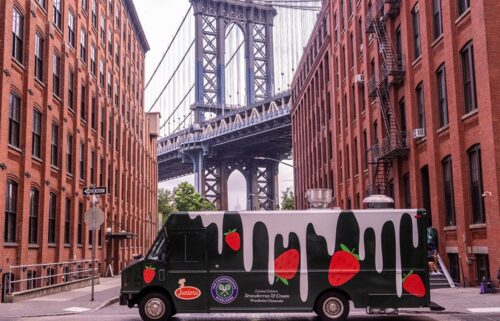17 unusual alcohol laws that could get you busted across the world
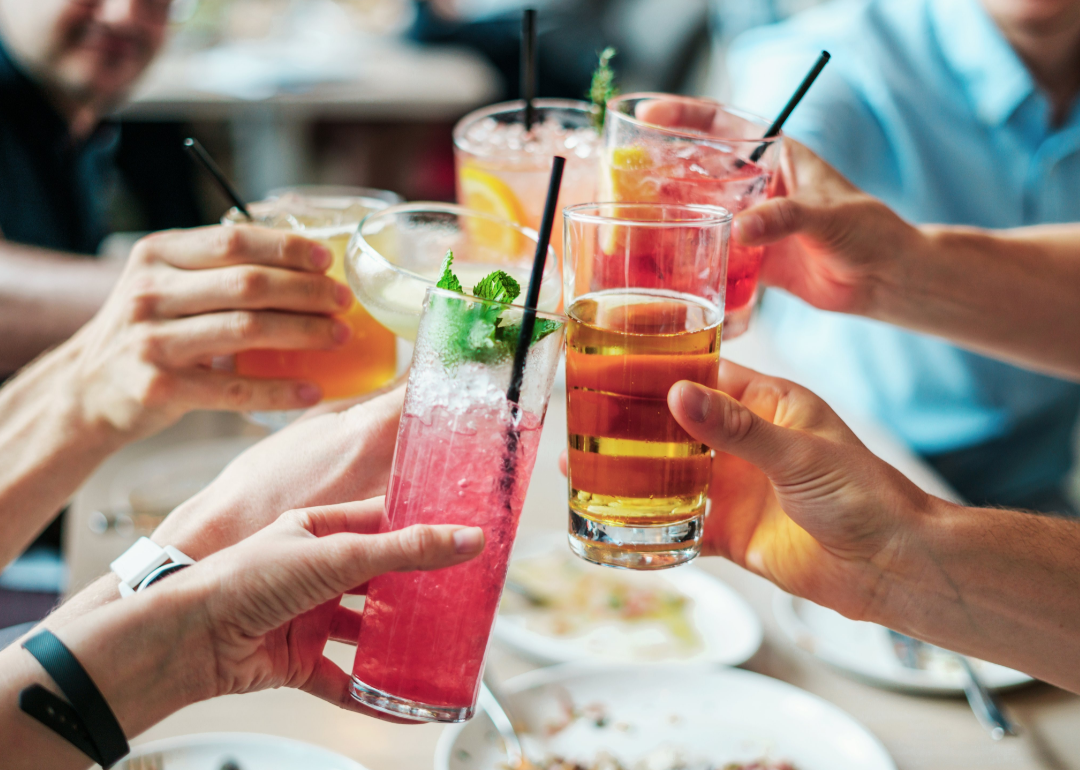
Canva
17 unusual alcohol laws that could get you busted across the world
Friends toasting with drinks.
It’s been 90 years since Prohibition was repealed in the United States with the passing of the 21st Amendment in 1933. But even though the law that outlawed alcohol manufacture and sales was ultimately repealed, that doesn’t mean the U.S. became a free-for-all when it came to liquor distribution and consumption.
In fact, after the national ban was lifted, each state had its own approach to legalizing the hard stuff—and as a result, there are still lots of laws to keep boozehounds in check throughout the nation.
CheapInsurance.com reviewed legislative statutes of U.S. state liquor laws and scoured news stories from around the world to find some of the weirdest laws related to alcohol that are still enforced today. Some hark back to a more puritanical time of temperance and morality, while others boil down to a public safety issue. Still, others are a bit more baffling and may leave you scratching your head wondering, “Why?”
Read on to learn about 17 of the most unusual reasons you could get nabbed for violating an alcohol law in the United States or around the globe.
![]()
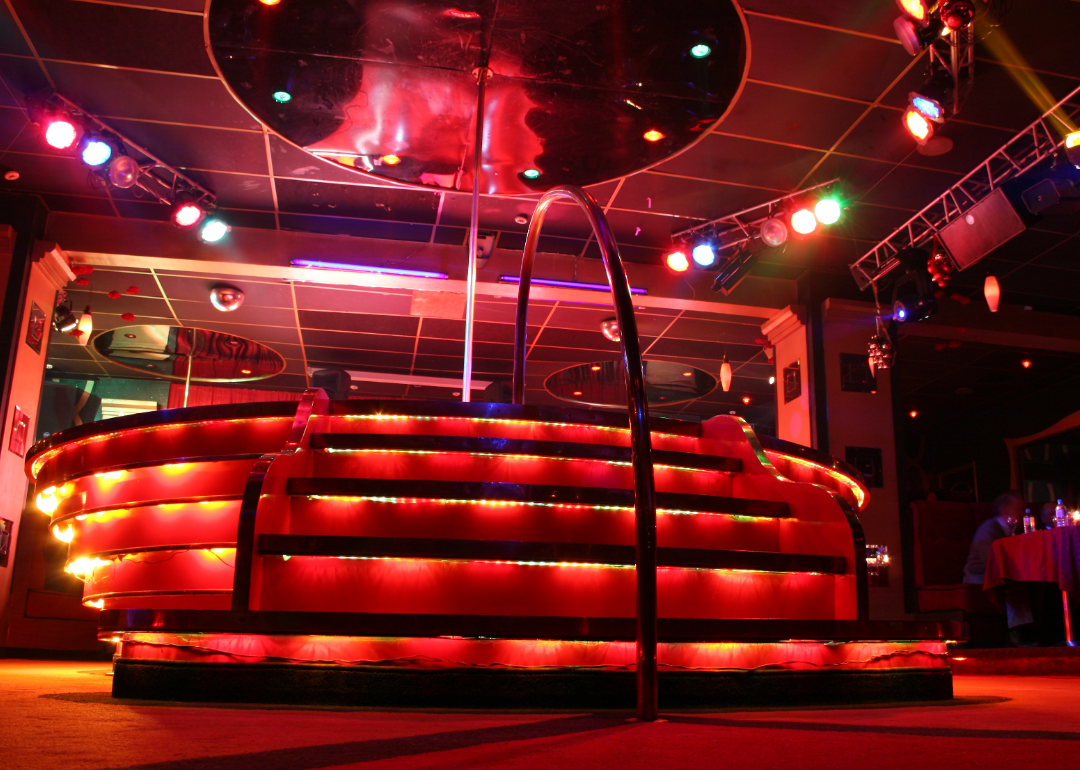
Canva
Nudes and booze are a no-no, New York City
Night club podium with red lights.
Although New York City is known for its nightlife (and its 4 a.m. last call), there’s one aspect of its entertainment offerings that restricts alcohol entirely: all-nude strip clubs. Gentlemen’s clubs that feature exotic dancers who bare it all aren’t eligible for liquor or beer and wine licenses—so selling a bottle of bubbly at one of these clubs could get a proprietor busted.
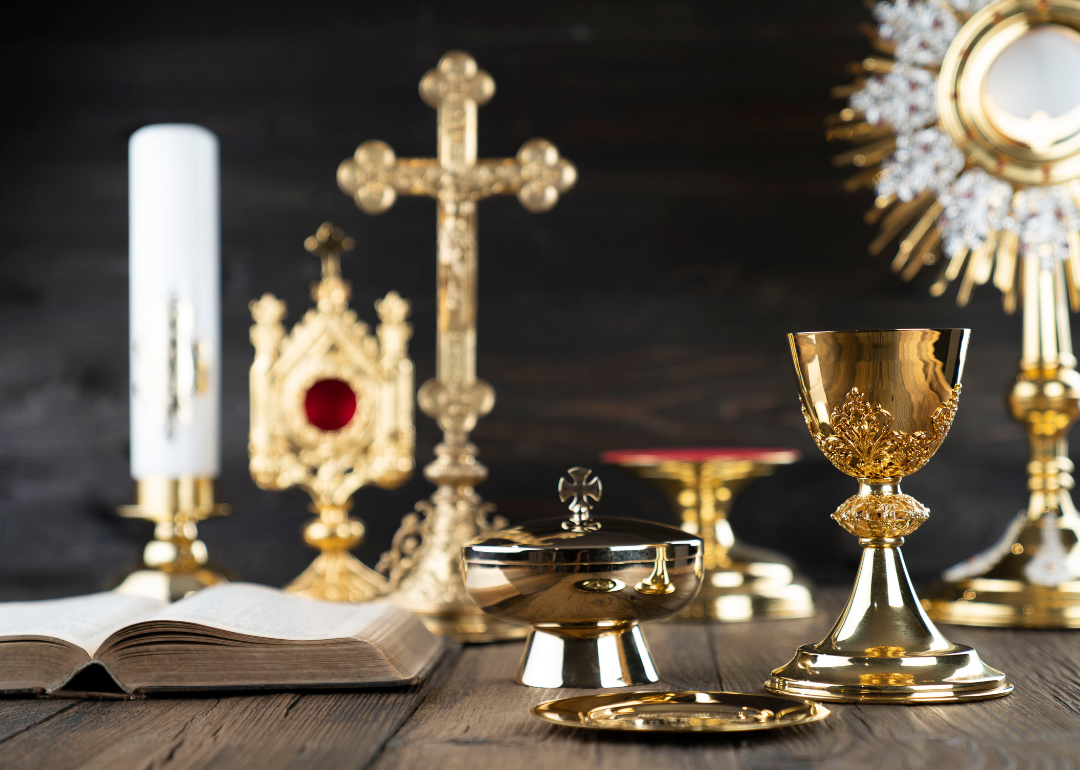
Canva
Keep the booze away from the communion wine, New York State
Items from church altar.
In New York, the State Liquor Authority restricts the sale of whiskey, vodka, and other types of liquors within 200 feet of—or even on the same street as—any place of worship. It’s called the “200 Foot Law,” and it applies to both restaurants and “taverns” (or bars with pub food). Although these establishments can’t qualify for a liquor license, they can legally sell beer and wine within close proximity to a church, synagogue, or even a school.
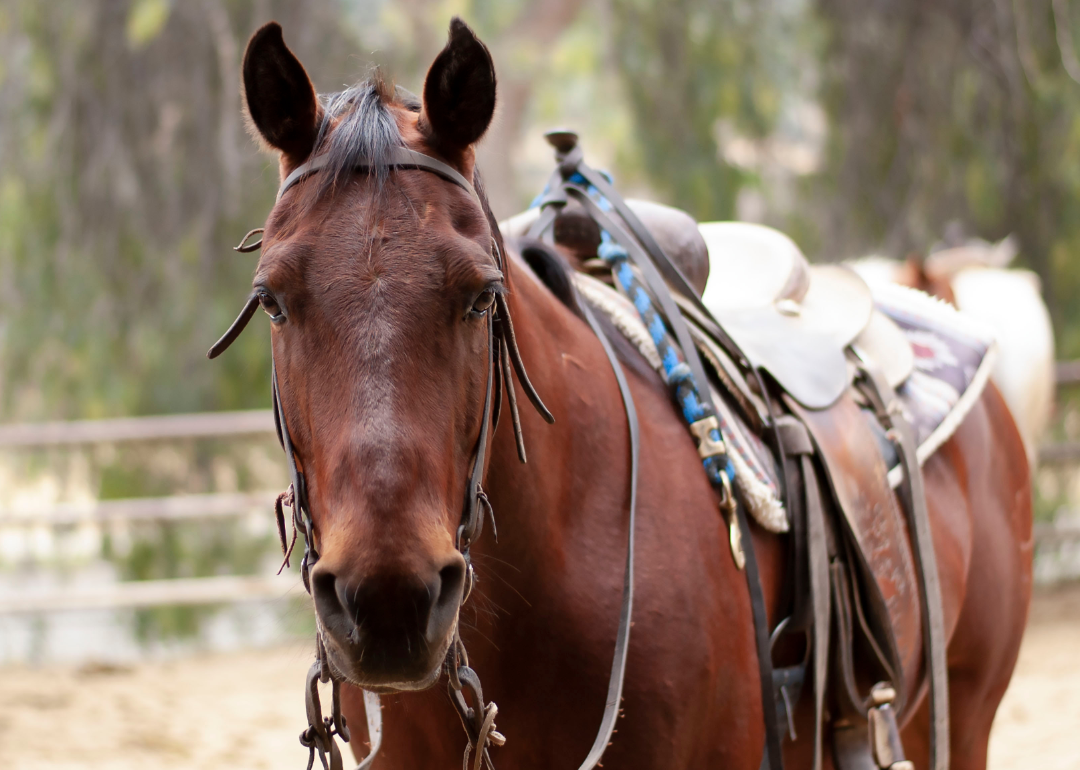
Canva
No hooch on a horse, California
Horse wearing saddle.
Throughout California, even adults of legal drinking age can’t enjoy an adult beverage while galloping down the street. That would be in violation of the state’s open container law because horses are considered vehicles under the state vehicle code—which also means you could get busted for a DUI if you’re found drunk while behind the reins. And that’s not all—you could also get charged with animal cruelty if the horse gets hurt in a drunk-riding accident.
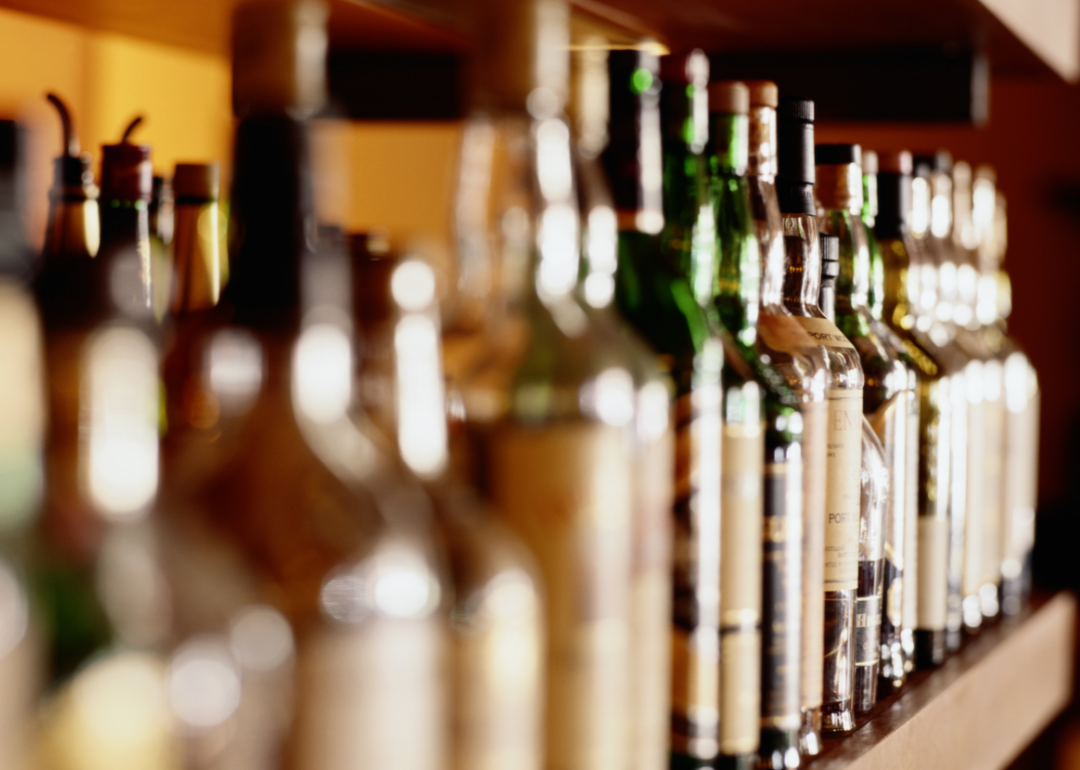
Canva
Dry by default, Tennessee
Liquor bottles close up.
Tennessee is one of three by-default “dry states” in the U.S. Translation: By default, the sale and public consumption of “intoxicating liquors” is outlawed. It’s then up to each county government to apply to the Tennessee Alcoholic Beverage Commission to become “wet” for alcohol retail in order to be permitted fully. Some counties, like Sevier County (home of Dollywood), go for the “moist” (or semi-wet) option—which allows for alcohol on a city-by-city basis under a number of restrictions.
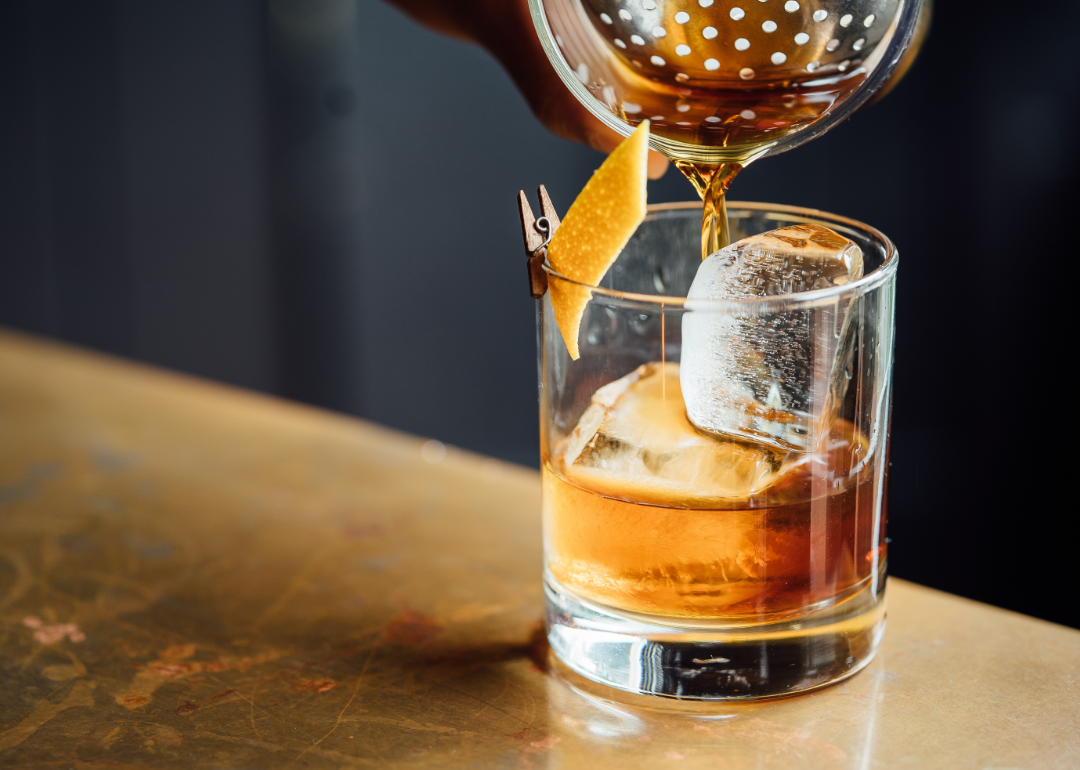
Canva
Perpetual Prohibition, Kansas
Close up pouring cocktail into glass on bar.
The other dry state in the U.S. is Kansas, which never voted to ratify the 21st Amendment in 1933. That means the state never repealed Prohibition—aka the 18th Amendment, which prohibited making, selling, or transporting alcoholic drinks beginning in 1919 (although you could consume them legally). Like Tennessee, the default is “dry,” which means serving and selling alcohol is officially outlawed—but individual counties that have approved a 1986 amendment to the state constitution are now allowed to sell and serve adult beverages.
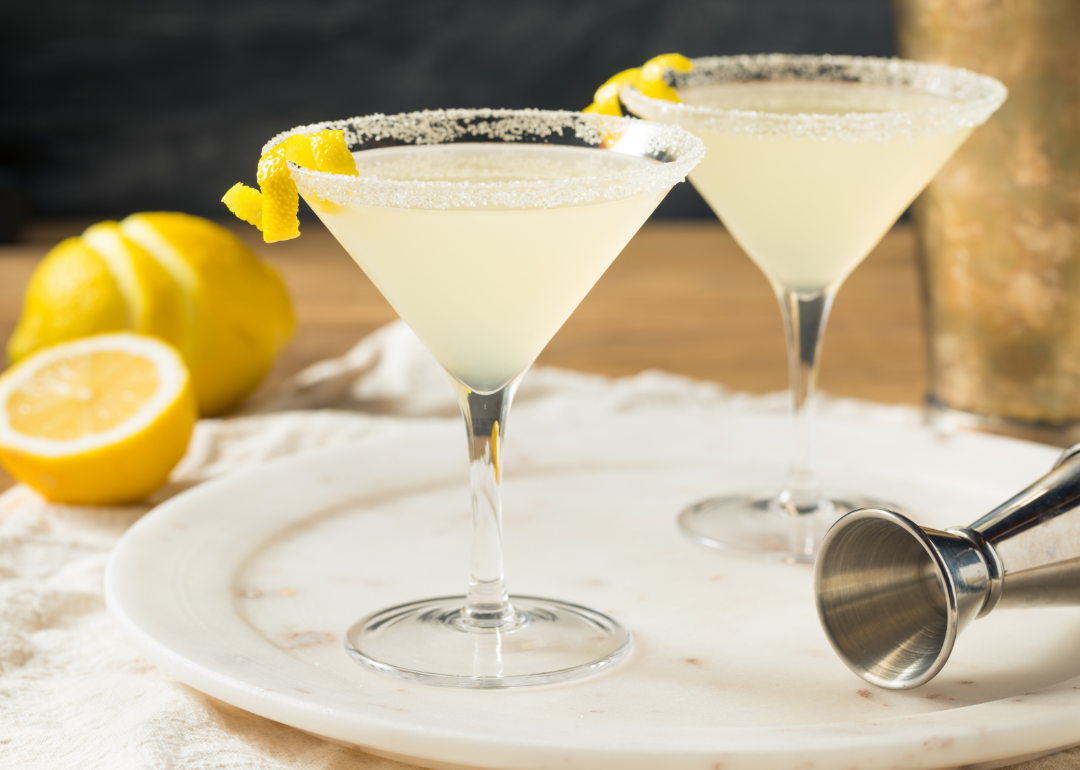
Canva
Mommy-and-me martinis, Ohio
Two lemon martinis on plate.
While the state of Ohio does stick to the National Minimum Drinking Age Act of 1984, which makes it illegal to purchase or be in possession of alcoholic beverages on your own under the age of 21, there’s an interesting exception to the rule. Under-agers can imbibe in public when accompanied by a parent or legal guardian who is “of age” and who provides the drink. They’ll just get busted if they try to order for themselves.
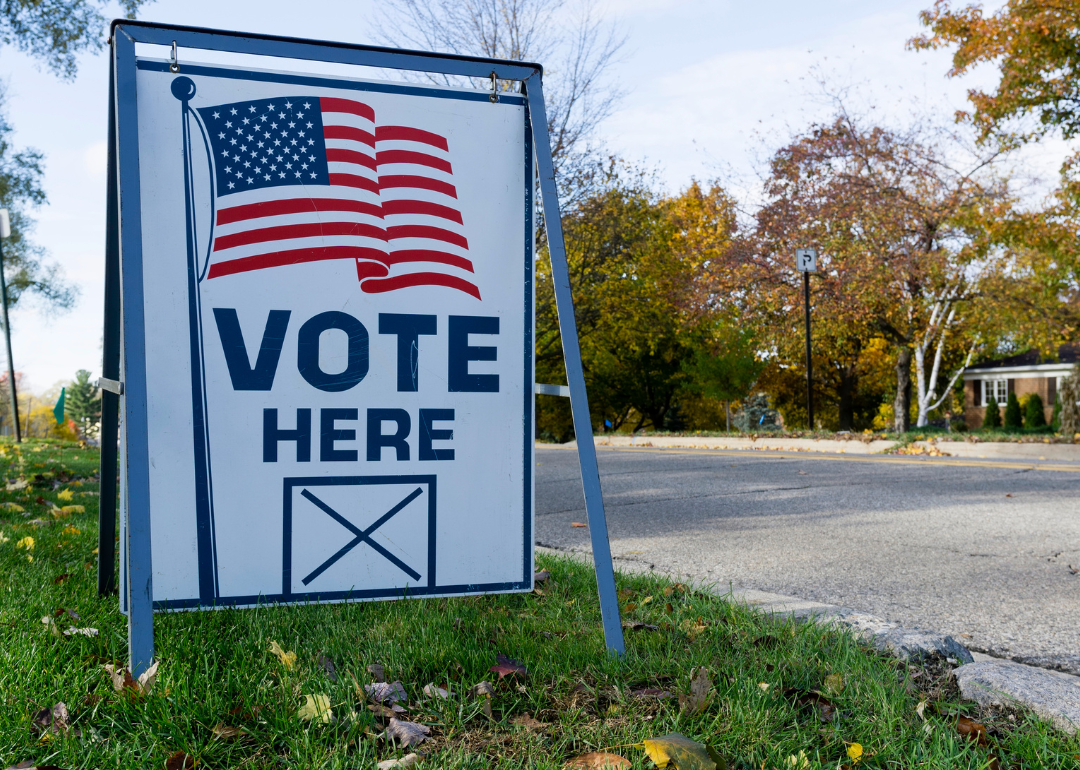
Canva
No tippling till the polls close, Alaska
“Vote Here” polling place sign in neighborhood.
In 2014, South Carolina became the last U.S. state to stop following a pre-Prohibition law that banned alcohol sales on Election Day. But that doesn’t mean that every state in the country allows its citizens to booze it up before casting their ballot. In Alaska, a law is still on the books that prohibits the serving or sale of alcoholic beverages until the polls close, which is usually 8 p.m. It’s only then that the bars can open—unless it’s in a city that’s adopted an ordinance that states otherwise.
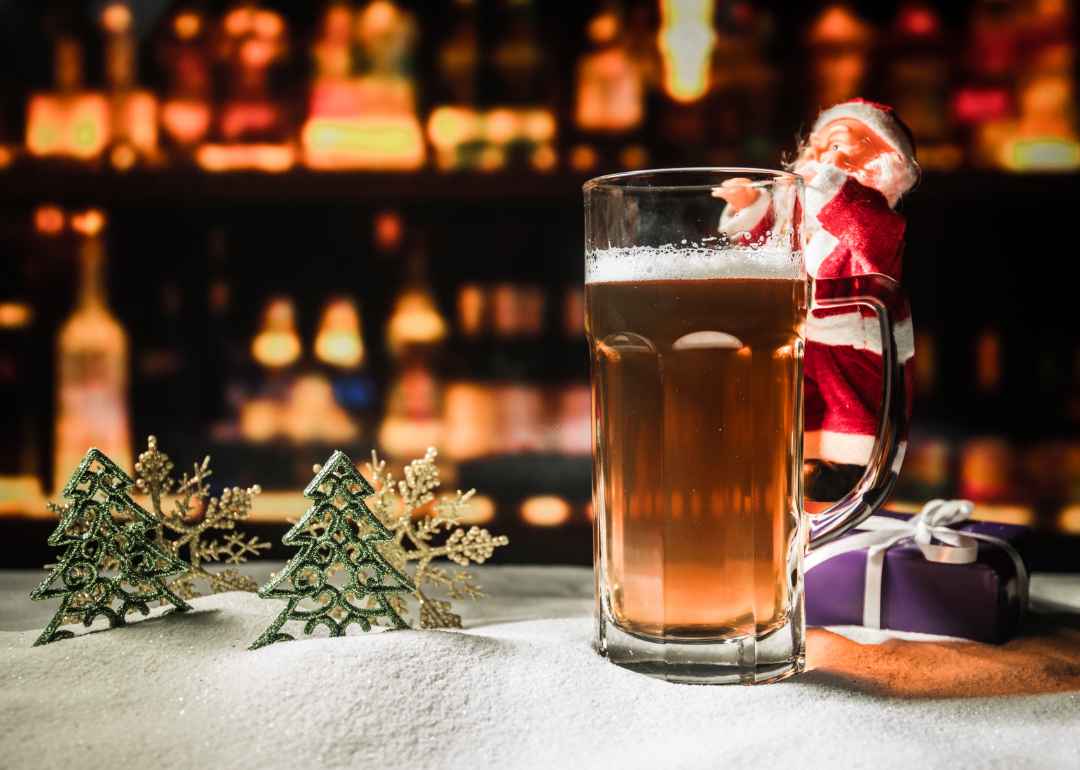
Canva
Sober for Santa, Allegany County, New York
Christmas decor and beer glass in bar.
In Allegany County, a southernmost county of New York adjacent to Pennsylvania, an odd law keeps its fine citizens sober for the coming of Santa Claus. Although grocery and convenience stores can normally sell alcohol until 1 a.m. on weekdays and weekends—and restaurants, bars, and taverns can all serve alcoholic drinks for on-site consumption until 2 a.m.—Christmas Eve is a different story, with an early closing time of 10 p.m. for both.
Any retailer or venue in violation of this deadline could get busted. Still, drinkers have another option: liquor and wine stores, which are exempt for some reason and can stay open at regular hours on the night before Christmas (which means until midnight on weekdays and until 9 p.m. on Sundays).
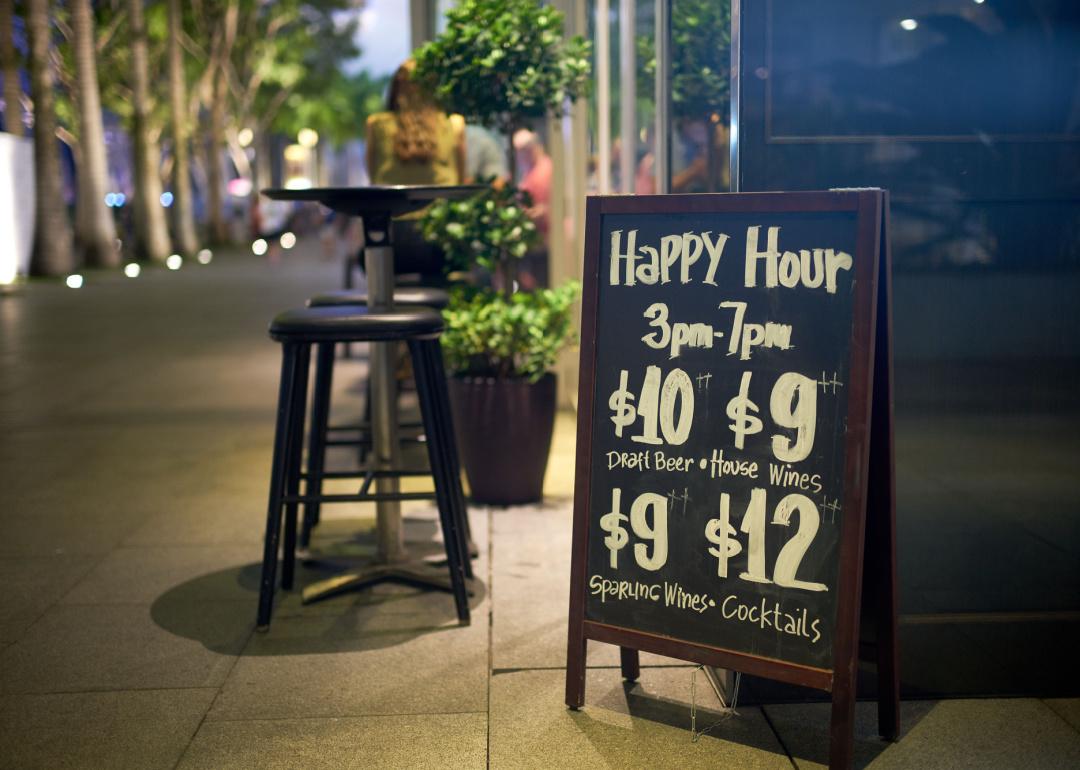
siemon // Shutterstock
Happy hour hindrance, Massachusetts
Happy hour sandwich board sign with specials.
The Alcoholic Beverages Control Commission of Massachusetts has a host of rules under what it calls its “Happy Hour Regulation”—which, as the name suggests, restricts the sale of discounted drinks during certain hours of the day (aka “time-limited drink specials“). In fact, the prices for alcoholic beverages must remain constant for the entirety of a calendar week. That same law, first enacted in 1984 as part of a campaign against DUIs, could get a bar or restaurant busted for selling an entire pitcher of beer or an entire bottle of wine to just one person, too—no matter what time of day or day of the week.
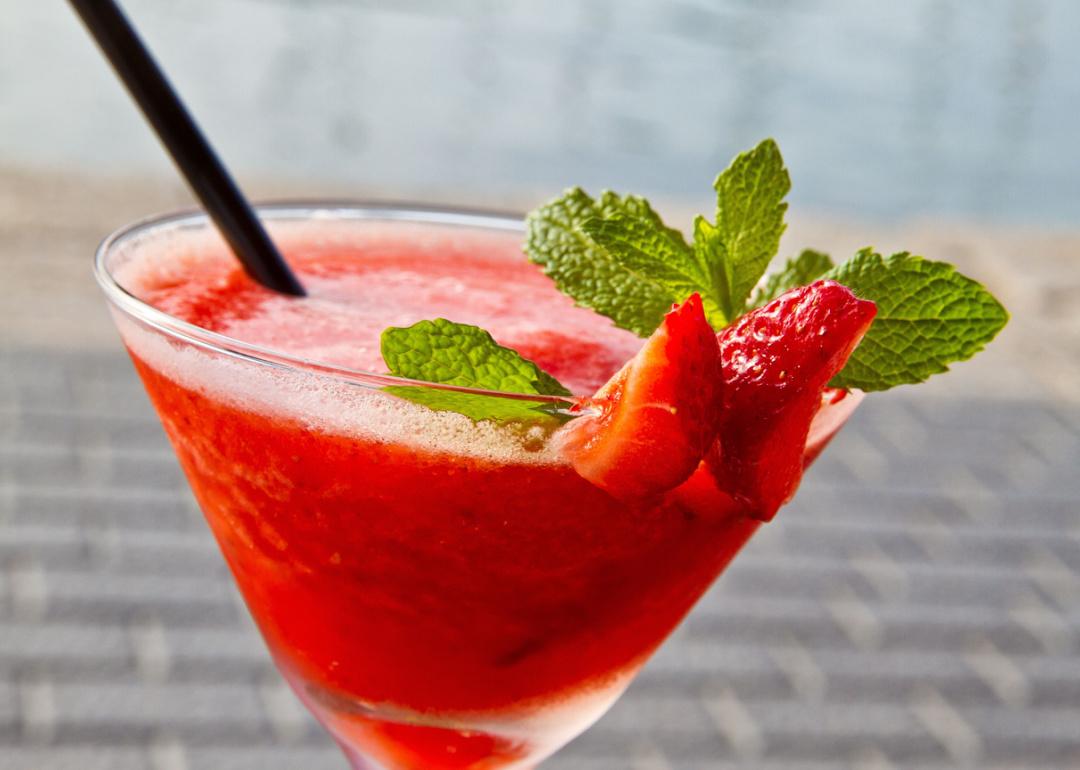
Juergen Faelchle // Shutterstock
Straw-sipping at the daiquiri drive-thru, Louisiana
Close up strawberry daiquiri with straw.
Most U.S. states have laws on the books about not driving while under the influence of alcohol—and not drinking while driving. But in Louisiana, there’s a workaround to the “open container” law that’s allowed patrons to purchase daiquiris at the drive-thru since 1981: They have to be frozen, and they have to be covered by a lid that’s not been pierced by a straw. You could get busted, however, if you try to drink your spirited slushy through that little hole in the top, as none of the contents can be removed from the cup while you’re in the car.
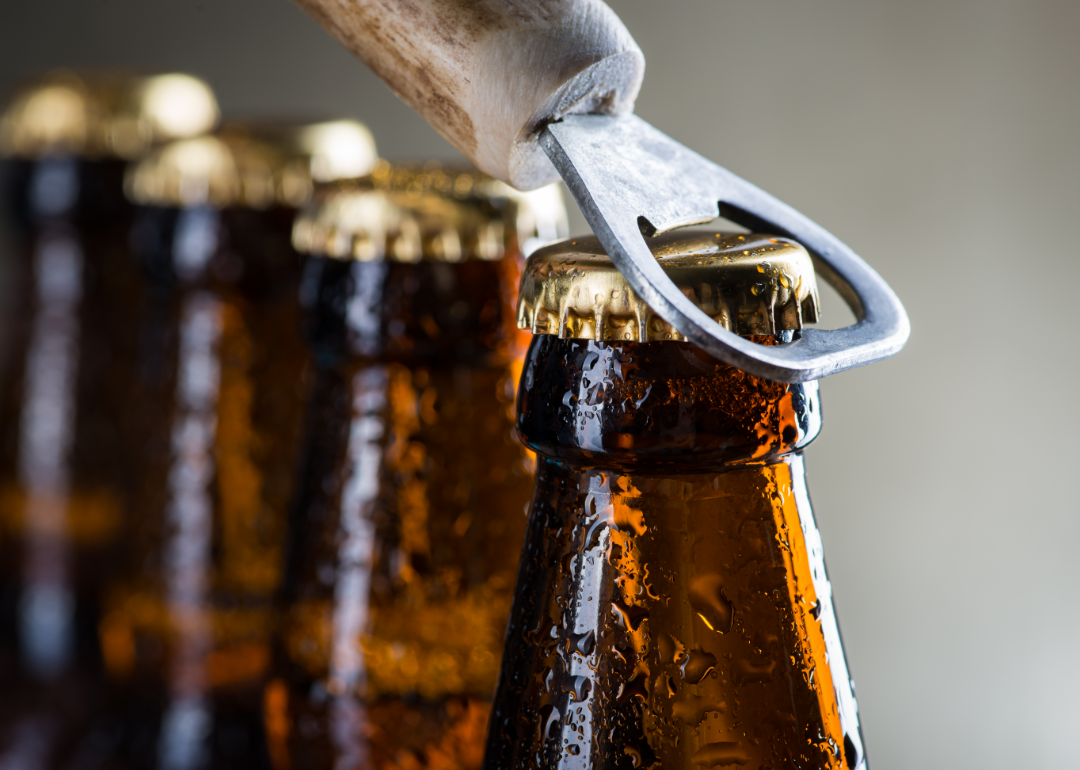
Canva
Cold beer crime, Indiana
Bottle opener ready to open cold bottle of beer.
It’s a Class B misdemeanor in Indiana for convenience stores, grocery stores, and drug stores (all considered “beer dealers”) to sell beer that’s been chilled in any way—a relic from the post-Prohibition “blue laws” that attempted to instill a sense of moderation in those who partake in adult beverages. (Theoretically, selling the beer at room temperature would keep the customer from cracking it open right away and maybe even finishing it on the ride home.)
That makes Indiana the only U.S. state to restrict alcohol sales based on its temperature. Want a cold brewski without getting busted? Head to an Indiana liquor store (where cold carryout is legal) or a local brewery, which can sell its own beer at a drinkable temperature.
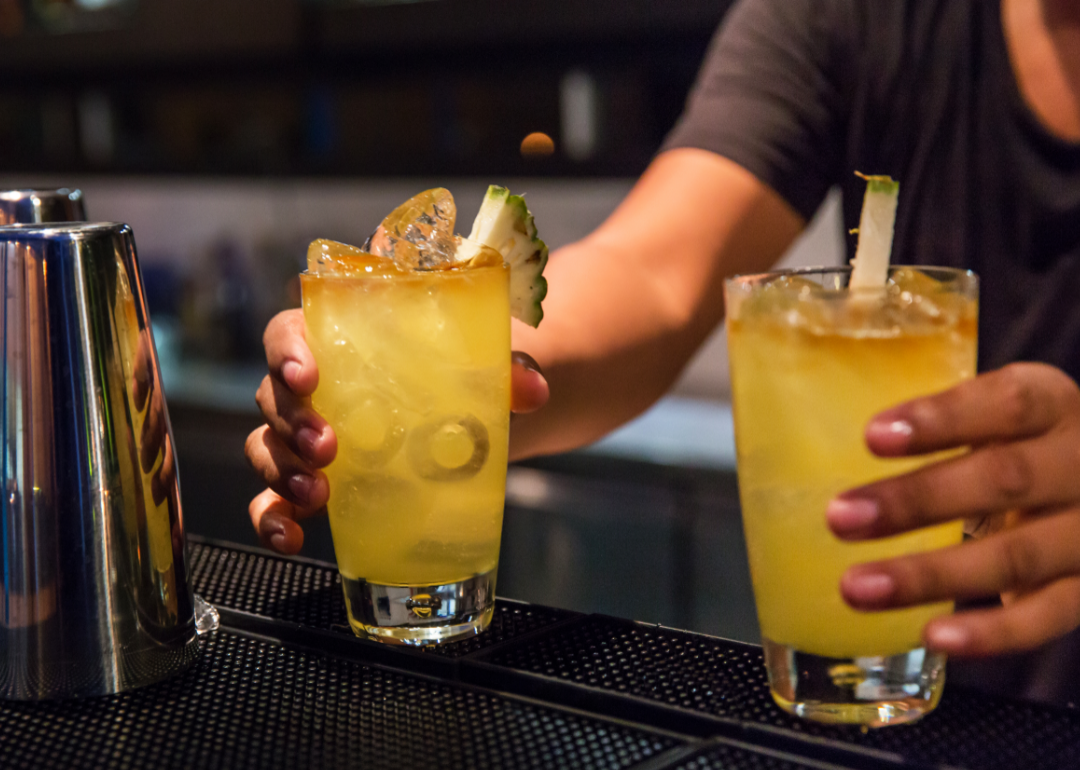
Canva
Banned bottomless brunch, Oklahoma
Bartender serving buy-one-get-one cocktails.
Establishments in Oklahoma are banned from offering alcoholic beverages that are available in truly unlimited quantities—aka “bottomless”—for a single fixed price. Likewise, they can’t give away drinks or host BOGO (buy-one-get-one) deals. However, the sky’s the limit in terms of the number of drinks that a restaurant or bar can sell to a patron who’s paying per serving—that is until they become intoxicated (at which point they can’t be served and must leave the premises).
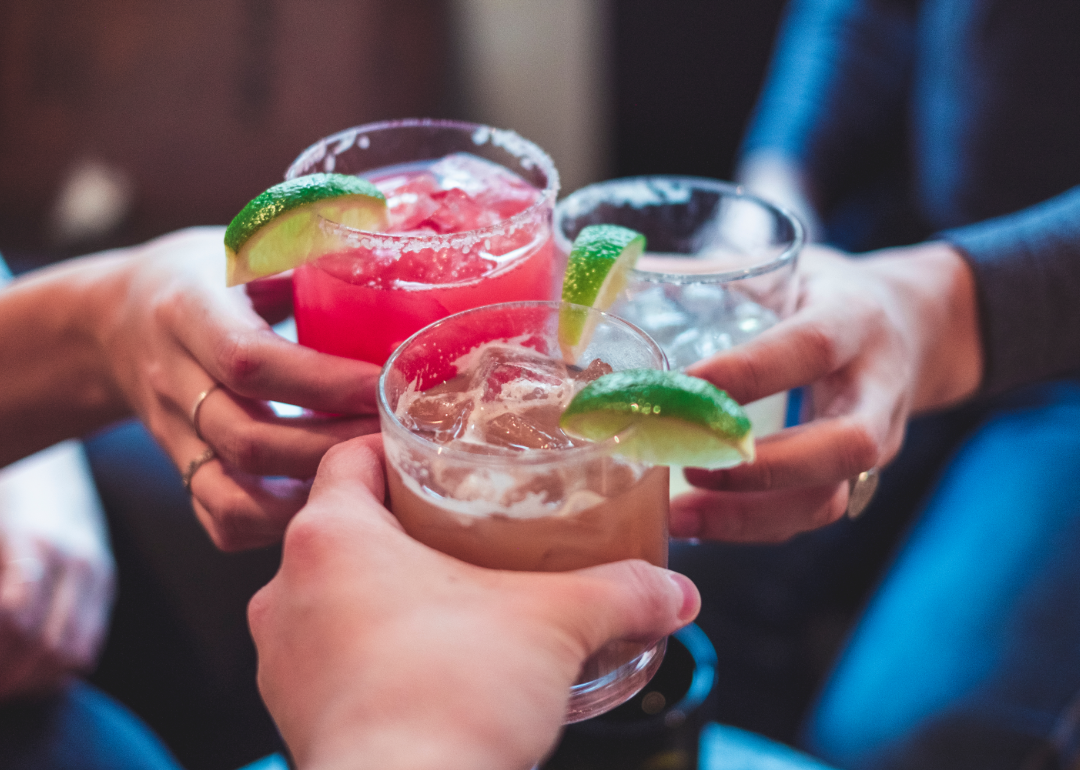
Canva
Wasted while at home, Utah
Friends toasting with drinks at home.
According to the Utah Department of Public Safety, it’s not just public drunkenness that’s illegal—you could also get busted for being intoxicated in private, where you might “unreasonably” disturb somebody else. That means it’s actually against the law to “get drunk” anywhere in the entire state of Utah—even at home, where you could be charged with a Class C misdemeanor if caught! The definition of “under the influence” is the strictest in the country, too: The blood alcohol content limit for a DUI is just .05%, compared to .08% in all other 49 states and the District of Columbia.
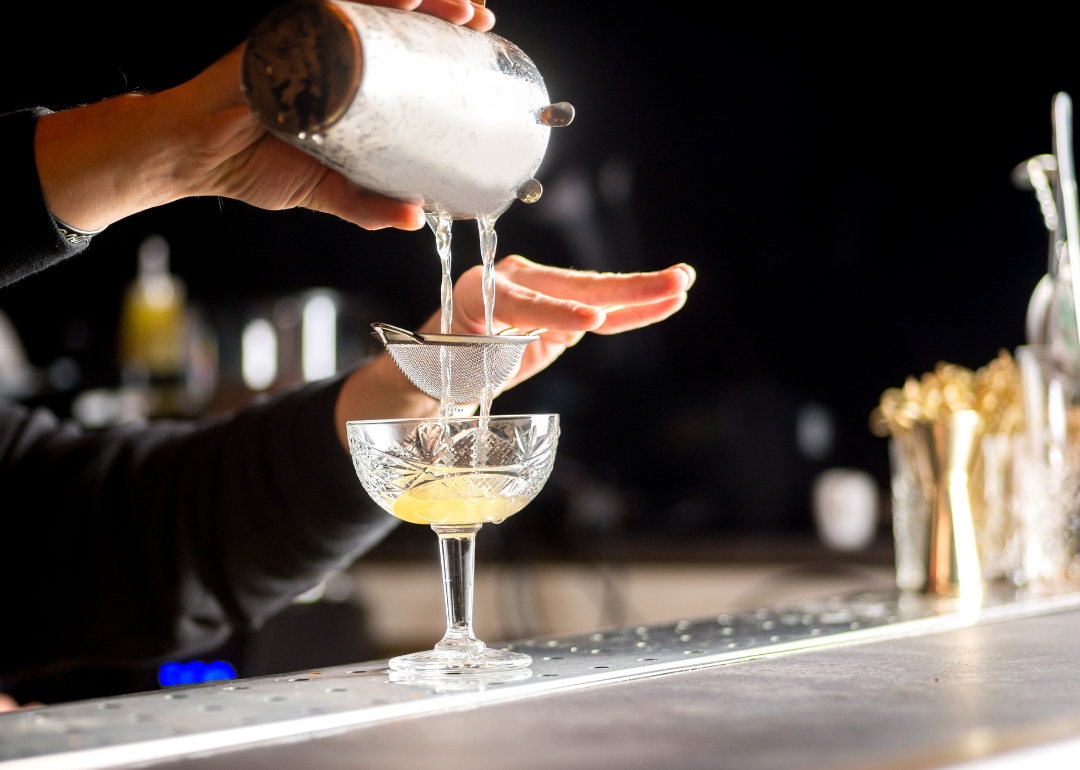
Canva
Hands off the barkeep, Nebraska
Bartender pouring cocktail.
Nebraska’s Liquor Control Commission explicitly forbids physical touching between customers and staffers at its licensed establishments. In fact, Section 019.01F1 of its Rules and Regulations specifically mentions “any kissing, or any touching of the breast, buttock, or genital areas.” The state liquor law therefore forbids consummating your crush on the bartender—or making any sexual contact with dancers at strip clubs.
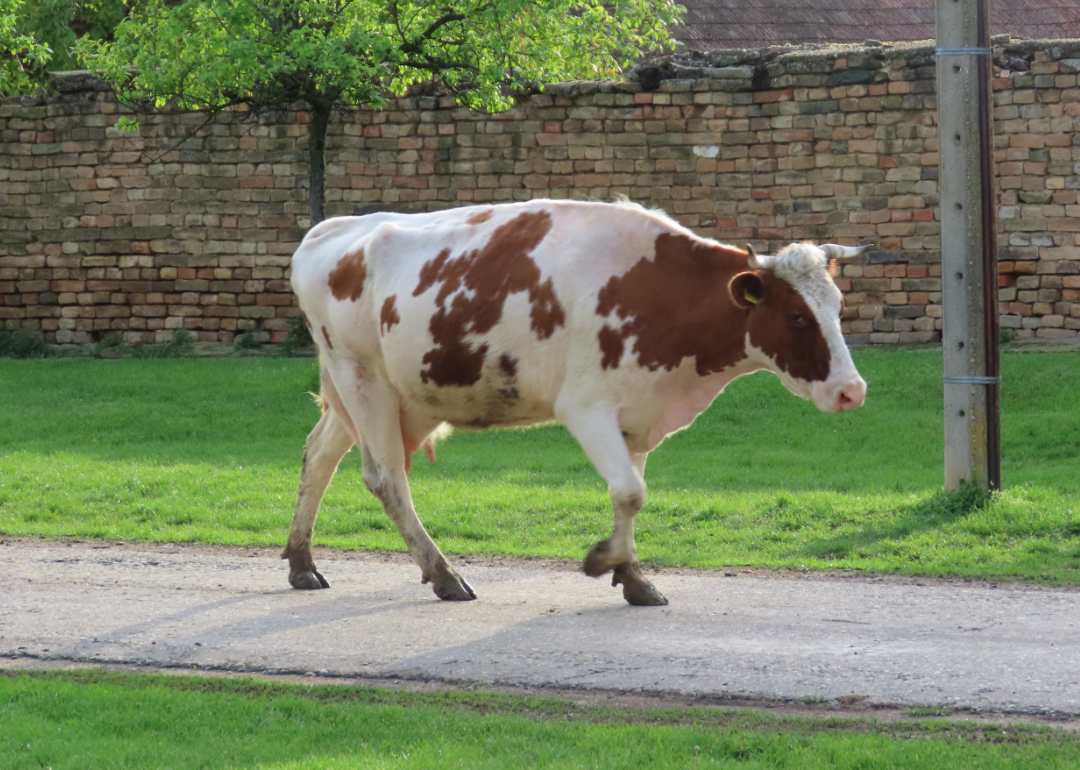
Canva
Don’t bring your cows home drunk, United Kingdom
Cow walking on pavement in village.
The United Kingdom’s Licensing Act of 1872—much of which is currently enforced—prohibits being in charge of a cow while drunk. So, if you’re planning on getting loaded, make sure you’re done driving your cattle before you head to your local pub.

Canva
Whipped for wine consumption, Saudi Arabia
Aerial view of Riyadh, Saudi Arabia.
The experts at Fodor’s Travel advise that manufacturing, selling, consuming, or even just having alcohol in your possession is an offense punishable by flogging in Saudi Arabia. In fact, according to Amnesty International, flogging is a mandatory punishment for anyone the Saudi religious police force catches drinking alcohol—or even using cooking wine—as it’s in violation of Shariah, or Islamic law, to which the kingdom strictly adheres.
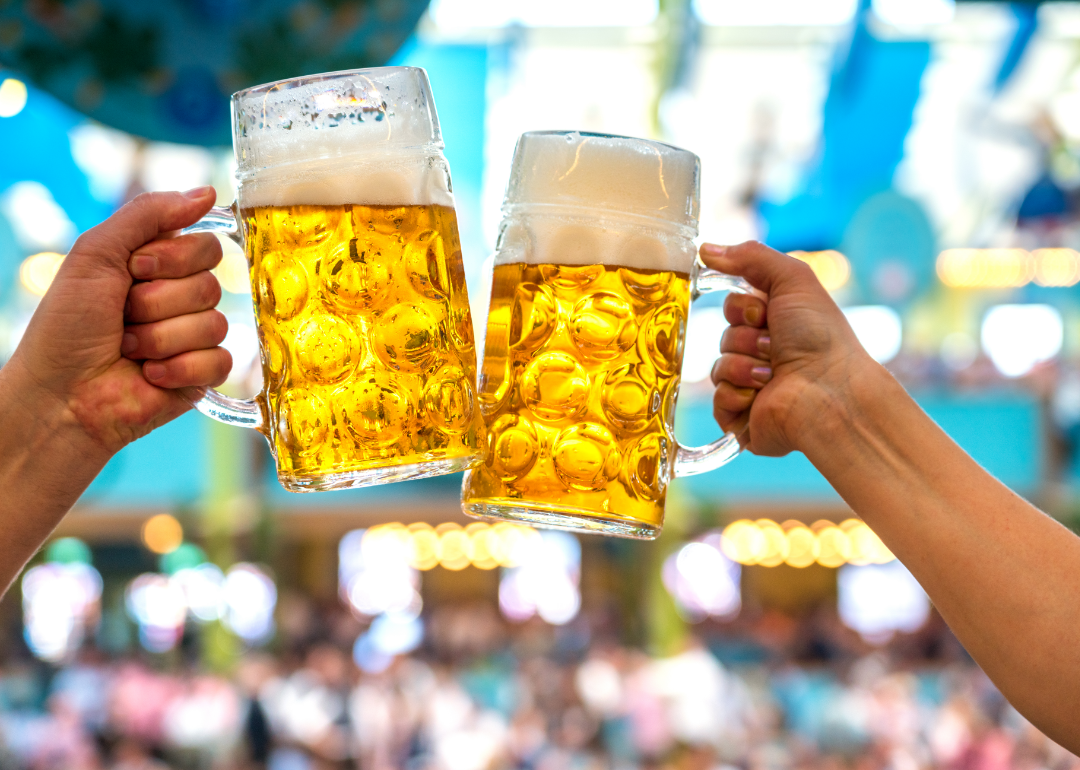
Canva
Keep your beer unadulterated, Germany
Two people raise mugs of German beer at Munich Beer Fest.
A “beer purity law” has strictly regulated the ingredients that go into German beer for over 500 years (and counting). It’s called “Reinheitsgebot,” and it was issued in 1516 to ban using wheat to make beer so its supply could be reserved for bread-making. But the added benefit was that it also protected consumers by preventing brewers from contaminating their lagers with anything nefarious (like hallucinogens) beyond the basic ingredients of water, hops, malted grains, and, as of 1906, yeast.
Today, the German Brewers Association still uses it as a guideline for making heritage-style beers. But unlike in the 16th century, you won’t get your beer confiscated if you don’t follow the law to a T.
This story originally appeared on CheapInsurance.com and was produced and
distributed in partnership with Stacker Studio.

